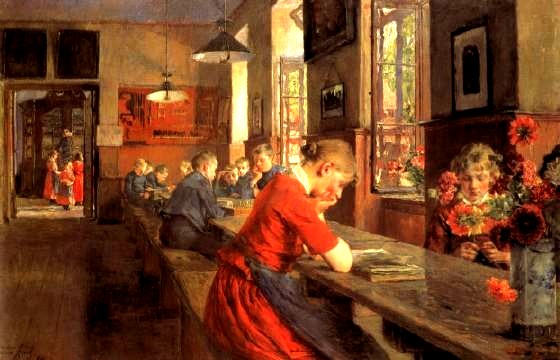
Monday
The United States has finally come to its senses and reopened the government, but while we were stumbling through our presidential temper tantrum, a couple of publications talked about the salutary effects of reading. A Washington Post article recounted stories of furloughed workers plunging into books, and a Nation article argued that fiction is now more important than ever. In every dark cloud one finds such silver linings.
Sarah Wendell talked about the joys of genre fiction, observing,
It’s a rather substantial act of trust to place one’s time and energy in the hands of a writer, especially during a difficult period. A reader, especially a fan of certain genres, begins a novel confident that there will be a competent resolution, that all will be well in the end. For some furloughed workers unable to seek additional employment — and those adjacent to the terrible standstill — seeking literary solace is only natural.
She cited as an example a reader working her way through Amie Kaufman’s and Jay Kristoff’s Illuminate series, a young adult space opera:
“Thank goodness for books right now,” says Stacie Chapman, a Maryland-based survey statistician at the Census Bureau. “They are the only thing keeping me half sane!… Reading takes me away from reality, and the reality right now is awful,” Chapman says. “If I’m reading, I’m not refreshing the news or Twitter and getting angrier and angrier. Instead I stay nice and relaxed.”
Laila Lalami, meanwhile, focused on recent topical fiction. For those overwhelmed with all the Trump news, she says, literature provides a counterweight:
Stories help us see the world through the eyes of others: We see what they see; we’re provoked or inspired or amused; we take sides or withhold judgment—but in the end, we find order in disorder. We make sense of the world around us through the language of stories. When we follow a narrative thread, we experience, at least for a while, a feeling of control. Reading fiction also allows us to expand the limits of our imagination and helps us develop empathy—qualities that seem to be in short supply at the moment.
Given the president’s inflammatory rhetoric about immigrants, Lalami recommends several recent books on immigration:
To really understand how immigration affects people on either side of the border, we have to turn to fiction. In The Leavers, for example, Lisa Ko writes powerfully about a Chinese-American boy who returns home from school one day to find that his mother, an undocumented worker at a nail salon in the Bronx, has disappeared. Ko explores the trauma of family separation through the perspective of this child, showing us the additional damage done to him by the well-meaning white family that later raises him in upstate New York. Chang-rae Lee’s Native Speaker explores migration from a different angle altogether. Here, we meet a Korean American who works as an industrial spy and has been hired to collect information about a politician, also a Korean American. In quiet, precise language, Lee examines the challenges of assimilation in America, as well as the lengths to which someone will go in order to truly feel at home.
She also mentions a more upbeat novel, Into the Beautiful North, which sounds like a version of Kurosawa’s The Seven Samurai. A Mexican woman gathers a posse to go north to recruit seven men who will help them defend their village against bandits.
Lalami also mentions an older work, James Baldwin’s Giovanni’s Room, for those seeking to understand LBGTQ issues (especially in light of Trump’s recent attacks on transgenders). Lalami writes that these novels
showed me what life does to all of us, how it tests and humbles and reveals us, regardless of our private history or public identity. And fiction does so much else, too: It gives us the infinite pleasures of prose, the surprise of encountering something unexpected on the page, and an escape from the tedium and stress of our daily routines.
Reading fiction, she writes, helps her focus on what’s important, which in turn leads to political participation. Against all expectation, she threw herself into the midterm elections:
Instead of spending my time reading the tea leaves of his pronouncements, I choose to spend it on novels. Making time for fiction helps me to stay out of the news bubble and ultimately enables me to be more engaged as a citizen.
Reading literature, in other words, can be a powerful prelude to action.

